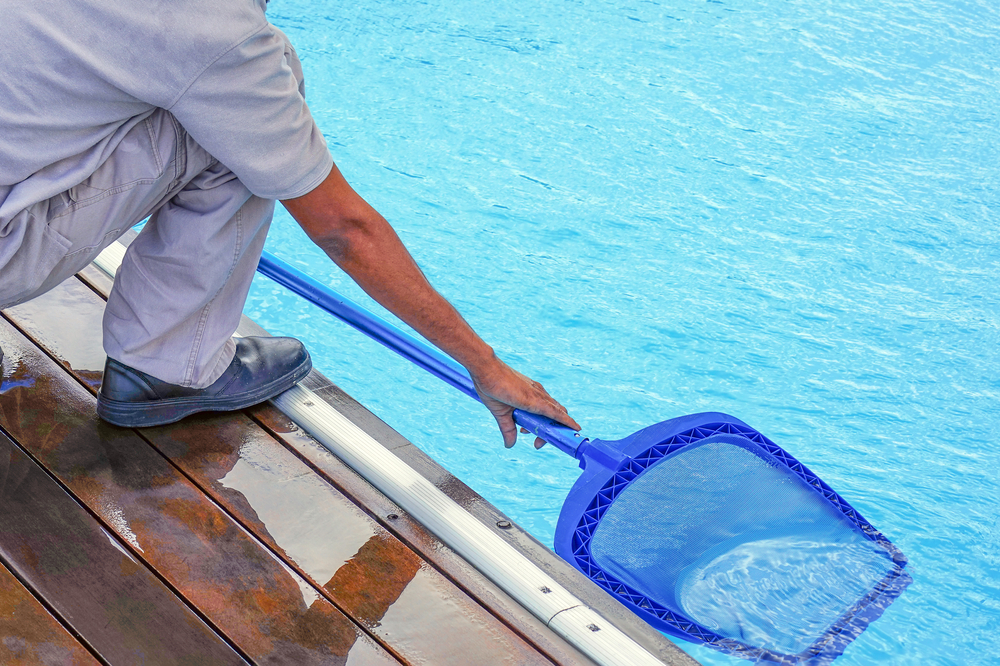Maintaining a clean and well-functioning pool is essential for enjoying a refreshing and safe swimming experience. Proper pool care involves a combination of regular maintenance tasks and a basic understanding of water chemistry. By following a few key steps and staying on top of maintenance, you can keep your pool sparkling clean and ready for summer fun. At Patriot Pools, we’ve been advising Marylanders on how to properly maintain their pools for years and wanted to go over some of the basics of pool care.

Water Balance
Maintaining proper water balance is crucial for pool care. The three primary factors to consider are pH, alkalinity, and calcium hardness. pH levels should ideally be between 7.2 and 7.6, slightly alkaline. Alkalinity helps stabilize pH levels and should be kept between 80 and 120 parts per million (ppm). Calcium hardness measures the amount of dissolved calcium in the water, which should be maintained between 200 and 400 ppm. Regularly testing and adjusting these levels will promote comfortable swimming conditions and prevent damage to pool surfaces and equipment.
Filtration System
The filtration system is the heart of your pool’s cleanliness. It removes debris, dirt, and microorganisms from the water, keeping it clean and safe. It’s important to clean or backwash the filter regularly to ensure it functions optimally. Sand filters should be backwashed when the pressure gauge indicates an increase of about 8 to 10 pounds per square inch (psi). Cartridge filters require periodic cleaning and replacement, depending on the manufacturer’s recommendations. A well-maintained filtration system will keep your pool water crystal clear.
Chlorine and Sanitization
Chlorine is a commonly used sanitizer that helps eliminate bacteria, viruses, and other contaminants from the pool water. Maintaining the appropriate chlorine levels is essential for maintaining a safe swimming environment. The recommended range for chlorine levels is typically between 1 and 3 parts per million (ppm). Regularly testing chlorine levels and adding chlorine as needed will help keep the water disinfected and prevent the growth of harmful microorganisms.
Cleaning and Skimming
Regular cleaning and skimming are essential to prevent debris from accumulating in your pool. Skimming the water surface with a net or skimmer basket removes leaves, insects, and other floating debris. It’s advisable to skim the pool daily, especially during periods of heavy foliage or wind. Additionally, brushing the pool walls and vacuuming the floor regularly will prevent the buildup of algae and maintain a clean and inviting pool environment.
Shocking the Pool
Shocking the pool involves adding a high dose of chlorine or non-chlorine shock to the water. This process helps oxidize contaminants, eliminate algae, and restore water clarity. Shocking is typically done on a weekly or bi-weekly basis, depending on pool usage and weather conditions. Follow the manufacturer’s instructions and test the water after shocking to ensure the chlorine levels return to the recommended range before swimming.
Get Some Professional Pool Cleaning Help
By following these basic principles of pool care, you can maintain a clean, inviting, and safe swimming environment for yourself, your family, and your friends. However, sometimes the touch of a professional is needed. If you’re having some issues taking care of your pool or have some questions, you can reach out to us at Patriot Pools. Contact us through our site, or give us a call at (410-526-SWIM).
